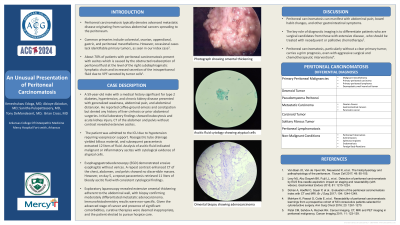Tuesday Poster Session
Category: Small Intestine
P4993 - An Unusual Presentation of Peritoneal Carcinomatosis
Tuesday, October 29, 2024
10:30 AM - 4:00 PM ET
Location: Exhibit Hall E

Has Audio
- KE
Kenechukwu C. Edoga, MD
Arkansas College of Osteopathic Medicine
Fort Smith, AR
Presenting Author(s)
Kenechukwu C. Edoga, MD1, Abioye Abiodun, MD1, Sanitha Pulapattassery, MD1, Tony DeMondesert, MD2, Brian Cross, MD2
1Arkansas College of Osteopathic Medicine, Fort Smith, AR; 2Mercy Hospital, Fort Smith, AR
Introduction: Peritoneal carcinomatosis typically denotes advanced metastatic disease originating from various abdominal cancers spreading to the peritoneum. Common primaries include colorectal, ovarian, appendiceal, gastric, and peritoneal mesothelioma. However, occasional cases lack identifiable primary tumors, as seen in our index case
Case Description/Methods: A 59-year-old male with a medical history significant for type 2 diabetes, hypertension, and chronic kidney disease presented with generalized weakness, abdominal pain, and abdominal distension. He reported coffee-ground emesis and constipation but denied any history of liver cirrhosis or prior abdominal surgeries. Initial laboratory findings showed leukocytosis and acute kidney injury. CT of the abdomen and pelvis without contrast revealed extensive ascites. The patient was admitted to the ICU due to hypotension requiring vasopressor support. Nasogastric tube drainage yielded bilious material, and subsequent paracentesis extracted 12 liters of fluid. Analysis of ascitic fluid indicated malignant or inflammatory ascites with cytological evidence of atypical cells. Esophagogastroduodenoscopy (EGD) demonstrated erosive esophagitis without varices. A repeat contrast-enhanced CT of the chest, abdomen, and pelvis showed no discernible masses. However, on day 5, a repeat paracentesis retrieved 11 liters of bloody ascitic fluid with consistent cytological findings. Exploratory laparoscopy revealed extensive omental thickening adherent to the abdominal wall, with biopsy confirming moderately differentiated metastatic adenocarcinoma. Immunohistochemistry results were non-specific. Given the advanced stage of cancer and presence of significant comorbidities, curative therapies were deemed inappropriate, and the patient elected to pursue hospice care.
Discussion: Peritoneal carcinomatosis can manifest with abdominal pain, bowel habit changes, and other gastrointestinal symptoms. Primary peritoneal carcinomatosis, particularly without a clear primary tumor, carries a grim prognosis, even with aggressive surgical and chemotherapeutic interventions.
Disclosures:
Kenechukwu C. Edoga, MD1, Abioye Abiodun, MD1, Sanitha Pulapattassery, MD1, Tony DeMondesert, MD2, Brian Cross, MD2. P4993 - An Unusual Presentation of Peritoneal Carcinomatosis, ACG 2024 Annual Scientific Meeting Abstracts. Philadelphia, PA: American College of Gastroenterology.
1Arkansas College of Osteopathic Medicine, Fort Smith, AR; 2Mercy Hospital, Fort Smith, AR
Introduction: Peritoneal carcinomatosis typically denotes advanced metastatic disease originating from various abdominal cancers spreading to the peritoneum. Common primaries include colorectal, ovarian, appendiceal, gastric, and peritoneal mesothelioma. However, occasional cases lack identifiable primary tumors, as seen in our index case
Case Description/Methods: A 59-year-old male with a medical history significant for type 2 diabetes, hypertension, and chronic kidney disease presented with generalized weakness, abdominal pain, and abdominal distension. He reported coffee-ground emesis and constipation but denied any history of liver cirrhosis or prior abdominal surgeries. Initial laboratory findings showed leukocytosis and acute kidney injury. CT of the abdomen and pelvis without contrast revealed extensive ascites. The patient was admitted to the ICU due to hypotension requiring vasopressor support. Nasogastric tube drainage yielded bilious material, and subsequent paracentesis extracted 12 liters of fluid. Analysis of ascitic fluid indicated malignant or inflammatory ascites with cytological evidence of atypical cells. Esophagogastroduodenoscopy (EGD) demonstrated erosive esophagitis without varices. A repeat contrast-enhanced CT of the chest, abdomen, and pelvis showed no discernible masses. However, on day 5, a repeat paracentesis retrieved 11 liters of bloody ascitic fluid with consistent cytological findings. Exploratory laparoscopy revealed extensive omental thickening adherent to the abdominal wall, with biopsy confirming moderately differentiated metastatic adenocarcinoma. Immunohistochemistry results were non-specific. Given the advanced stage of cancer and presence of significant comorbidities, curative therapies were deemed inappropriate, and the patient elected to pursue hospice care.
Discussion: Peritoneal carcinomatosis can manifest with abdominal pain, bowel habit changes, and other gastrointestinal symptoms. Primary peritoneal carcinomatosis, particularly without a clear primary tumor, carries a grim prognosis, even with aggressive surgical and chemotherapeutic interventions.
Disclosures:
Kenechukwu Edoga indicated no relevant financial relationships.
Abioye Abiodun indicated no relevant financial relationships.
Sanitha Pulapattassery indicated no relevant financial relationships.
Tony DeMondesert indicated no relevant financial relationships.
Brian Cross indicated no relevant financial relationships.
Kenechukwu C. Edoga, MD1, Abioye Abiodun, MD1, Sanitha Pulapattassery, MD1, Tony DeMondesert, MD2, Brian Cross, MD2. P4993 - An Unusual Presentation of Peritoneal Carcinomatosis, ACG 2024 Annual Scientific Meeting Abstracts. Philadelphia, PA: American College of Gastroenterology.
